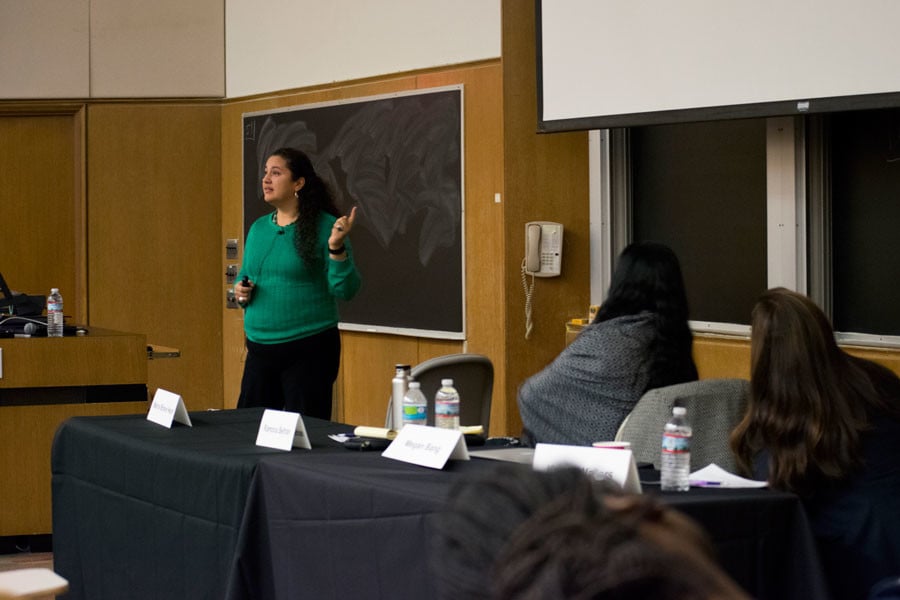Panel discusses intergenerational impacts, healing tactics for historical trauma
Lauren Duquette/Daily Senior Staffer
Panelists discuss the historical trauma in Native American and other marginalized communities at a panel Thursday. Co-hosted by One Book One Northwestern and the Edith Kreeger Wolf Endowment in Weinberg College of Arts and Sciences, the event was tied to “The Inconvenient Indian,” this year’s One Book selection.
January 8, 2016
Faculty members from U.S. universities dissected the collective historical trauma of Native American communities in a Thursday afternoon panel as part of a two-part event.
The panel, co-hosted by the Edith Kreeger Wolf Endowment in Weinberg College of Arts and Sciences and One Book One Northwestern, was titled “Dynamics of Historical Trauma, Community Resistance, Resilience, and Living Sovereignty” and featured faculty members from the University of New Mexico, the University of Denver and the University of Washington.
The discussion highlighted various ways of coping with and healing from historical suffering such as talking about the trauma, as well as other intervention efforts — from the recognition of trauma responses including survivor guilt, depression and hypervigilance, to story and truth telling. The trauma process is initiated by a consciousness of the grief and trauma that one is carrying, said University of New Mexico professor Maria Yellow Horse Brave Heart.
“Trauma is transferred across generations through impairment of traditional parenting skills, identification and other complex processes,” Brave Heart said. “Our trauma originates from the genocide (of Native Americans).”
The discussion was related to this year’s One Book One Northwestern selection, “The Inconvenient Indian,” which recounts relations between Native Americans and colonists after the arrival of Europeans in America.
In the discussion about the impact of the intergenerational effects of historical trauma, the panelists also brought up descendants of Holocaust survivors and Japanese-American internment camps in addition to the particular focus on Native American genocides.
“The panel is about how historical trauma has affected the Native American community, but that is not to say it doesn’t affect other groups of people that have had historical traumas in their lives,” said Nancy Cunniff, project coordinator of One Book One Northwestern.
NU graduate student Kalonji Nzinga said the panel’s topic resonated with him because of the broad impact of historical trauma across many populations.
“Historical memory or historical trauma is something that affects all of us … but specifically in our indigenous peoples because of the way that power structures are still reminiscent of those atrocities of the past,” he said. “I think that it’s important for us to unpack that collective memory and think about the traumas that exist today.
The second lecture in the series, titled “Living Relations: Dynamics in Cultivating Well-Being in Native Communities,” will take place Friday evening.
Email: [email protected]
Twitter: @fathma_rahman


